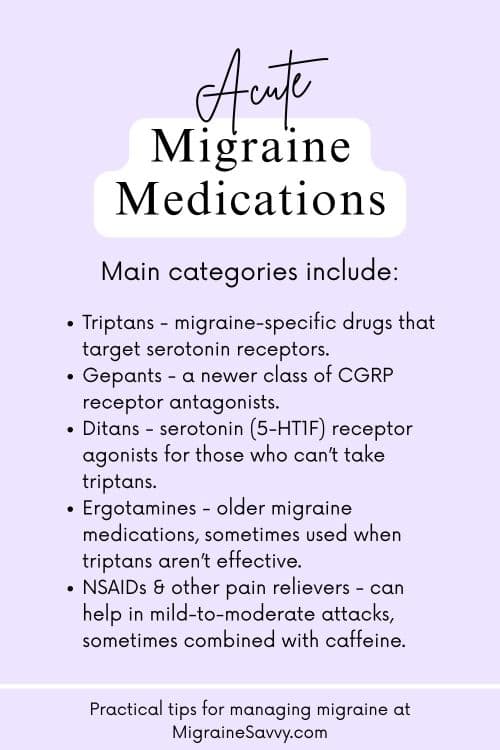- Home
- Medications
COMPLETE MAGNESIUM SUPPORT
My Top Choice - Magnesium Breakthrough - The ONLY supplement with all 7 essential magnesium types in one formula. Most only have 1-2 types, leaving you deficient.
10 Rescue Migraine Medications
To Keep You Out Of The ER
Migraine medications have come a long way in the past twenty years. Even more so in the past year or two.
Injection medications were not available back then, other than in the emergency room.
So to help you navigate a way to stay out of the ER, I have compiled this list for you to use.
My #1 Choice in Magnesium Supplements
I confess, the word injection instills a sense of fear in me. I hate needles, but I hate writhing in pain for ten days even more!
If you fail to respond to triptans or ergotamines, or a combination of, these ten migraine medications listed below can be used to find relief from an acute episode.
You have some good alternatives to a horrid visit to the emergency department.
They are all subcutaneously administered (under the skin). This means you may require some specialist training, and some courage.
If you get regular severe migraine attacks and are not able to make it to the emergency room in time, these migraine medications should be considered as part of your pain management plan.
Your 3 Lines of Defence To Stay Out of The ER
In order to keep you from a horribly painful visit to the ER, here is what Dr. Richard B. Lipton of the Montefiore Headache Center says you need to have in place as your 3 lines of defence: (source)
1. Work with your doctor to find the right abortive medication to break the cycle as early as possible.
2. Have some non-oral rescue medications. (listed below)
3. Plan for what to do in the ER. This means having a well specified plan with your doctor's instructions and his or her telephone number (if possible).
Feel free to print out this page and take it to your doctor to discuss your options.
Migraine Medications For Self-Injection
So before we get to the actual medications, I think it's really important to look at some of the side effects you may encounter.
It is essential to do your homework with your doctor beforehand.
Plan ahead for your 'worst case' scenario.
Some of these drugs have too many side effects to list individually, so I have provided the more common ones to watch for. You will still have to research the ones you decide to take thoroughly.
Now... according to my extensive research [4] , the most common severe allergic reactions for these 10 migraine medications generally seem to include:
• itchy skin rash or hives
• breathing difficulties
• tight chest or chest pain
• "swelling of the mouth, face, lips, or tongue; unusual hoarseness; wheezing"
• reduced mental capacity with depression and confusion
• decreased coordination and motor function
• muscle weakness
• fainting
• irregular heartbeat
• muscle spasms and numbness in limbs
• agitation and restlessness
• seizures
• constipation
• a noticeable "shuffling walk"
• fatigue
• persistent nausea
• persistent vomiting
• cold or flu like symptoms
• similar "symptoms to liver problems"
• involuntary muscle twitching or twisting
• loss of balance
• unusual bruising or bleeding
• unusual eye movements or inability to move eyes
• unusual or excessive sweating
• unusual tiredness or weakness
• unusually pale skin and
• vision changes (ie. blurred vision)

So, these seem to be the more general yet serious side effects listed for all ten rescue medications.
This list kind of makes me never want to take migraine medications ever again.
If you are one of those people who do not respond well to the acute treatment strategies, and struggle your way through taking drugs for migraines, then perhaps reading my migraine pain medication failed list will provide you with some motivation.
You might need some help to endure the trial and error of finding the most effective medication(s).
I urge you to stay focused and persevere to find the right migraine medications that work for you with the least amount of side effects. Or side effects that you can deal with from the medications that are less debilitating than the migraines alone.
Find what works, so you have it when you need it most.
LOOKING FOR RELIEF ?
MIGRAINE PAIN MANAGEMENT COURSE
I have a step-by-step pain management plan in my course. The first module is free so you can learn to manage your attacks asap... continue reading
The 10 Rescue Migraine Medications for Injection (A - Z)

Chlorpromazine (FDA approved 1950)
Dose: 12.5 mg slow IV push over 20 min (maximum 50 mg).
Aka - marketed in the United States as Thorazine and elsewhere as Largactil.
Class – Phenothiazine - antipsychotic and antihistamine.
Some common side effects – agitation, constipation, dizziness, sedation, hypotension, restlessness causing a continuous need to walk or more commonly referred to as a shuffle. Tremor or twitching (dystonia) are considered to be serious side effects.
Positives – relieves nausea and anxiety.
Dexamethasone
Dose: 6-8 mg IV push.
Aka – brand names - Baycadron, Dexamethasone Intensol, DexPak 10 Day Taperpak, DexPak 13 Day Taperpak, DexPak 6 Day Taperpak, Dexpak Jr. Taperpak, Zema Pak 10-Day, Zema Pak 13-Day, Zema Pak 6-Day, and Decadron (this brand is no longer sold in the US, generic brands may be available).
Class – anti-inflammatory, corticosteroid.
Some common side effects: mood changes, acne, insomnia, headache, dizziness, increased sweating, nausea, vomiting, skin rash, easy bruising, muscle weakness, anxiety and depression.
Severe side effects are: GI bleeding, swelling and increased susceptibility to infections.
Droperidol (1961)
Dose: 2.5 mg slow IV push over 30 min (maximum 7.5 mg)
Aka – brand names - Droleptan, Dridol, Inapsine, Xomolix, Innovar (combination with fentanyl which is a narcotic analgesic).
Class – sedative, anti-nausea, antidopaminergic, antiemetic, and antipsychotic.
This
one seems to have the least amount of side effects listed. They
include: anxiety, drowsiness, hyperactivity, restlessness, depression
(Dysphoria), hypotension, complete sedation, and some other things I cannot pronounce.
Dihydroergotamine - DHE45 + prochlorperazine
Dose: Mix DHE45 1 mg plus prochlorperazine 10 mg. Give 1.5 ml slow IV push over 1-3 min.
Aka – brand name - D.H.E. 45 is Migranal and prochlorperazine is also called Compazine (first to combat nausea from DHE 45).
Class – ergotamine and antiemetic.
Some common side effects: abnormal skin sensations, anxiety, diarrhea, dizziness, headache, increased sweating and flushing, nausea and vomiting.
Some of the more severe allergic reactions are:
temporary increasing or decreasing of your heart rate, itchy skin, chest
pain or tightness, “swelling of the mouth, face, lips, or tongue”,
breathing difficulties, muscle pain, numbness or weakness in your
limbs, tingling in the fingers and toes, and itching at the injection
site.
Magnesium sulfate (2001)
Dose: 1 gram IV push over 1 min
Aka – brand names – Sulfamag, Epsom Salt.
Class – laxative, anticonvulsant.
NO common side effects have been reported.
There
is a small list of the severe allergic reactions to watch for. These
include: irregular heartbeat, breathing difficulties, itchy skin rashes
or hives, chest tightness, swelling of the mouth, face, lips, or
tongue, dizziness, hot flushing, muscle weakness, fatigue, and increased
sweating.
Methylprednisolone (2005)
Dose: 250-500 mg IV push
Aka - brand names – Medrol, Depo-Medrol.
Class – anti-inflammatory, man-made corticosteroid.
Some
common side effects are: acne, dry skin, and bruising, slow wound
healing, increased sweating, nausea, sleep problems (insomnia), mood
changes, stomach pain, and bloating.
Olanzapine (1996)
Dose: 5-10 mg (immediate release and extended release).
Aka - brand names - Zyprexa, Zyprexa Relprevv, Zyprexa Zydis.
Class – atypical antipsychotic.
Some
common side effects: back pain, diarrhea, constipation, sore throat,
tiredness, light headedness, headache, nausea, vomiting swelling at the
injection site, increased appetite and weight gain.
Prochlorperazine (2001)
Dose: 10 mg slow IV push.
Aka - brand names - Compazine, Compazine Spansule, Compro, Stemetil, Phenotil, Buccastem, Stemzine.
Class – anti-nausea, typical antipsychotic, antiemetic.
Some common side effects are: constipation; dizziness; drowsiness; dry mouth; agitation; nausea; and stuffy nose.
Some
severe allergic reactions include: seizures, constipation, irregular
heartbeat, itchy skin, difficulty breathing, chest pain or tightness,
swelling of the mouth, hands, ankles, feet, face, lips, or tongue,
decreased coordination of motor skills, drooling, feeling faint, muscle
spasms and muscle weakness, numbness, prolonged or painful erection,
trouble urinating, agitation, tremors or twitching movements,
involuntary muscle movements. There’s more - unusual bruising or
bleeding; and blurred vision or visual disturbances.
Sumatriptan (1992)
Dose: 6 mg hypodermic.
Aka - brand names - Alsuma, Imitrex, and Sumavel DosePro.
Class – Triptan.
Some common side effects are: abnormal skin sensations like burning, tingling or numbness; anxiety; dizziness; drowsiness; or the reverse feeling of heaviness and pressure. Muscle aches or cramps; nausea and vomiting; neck stiffness. You may also experience pain, swelling, bruising, or bleeding at the injection site.
Severe allergic
reactions are: increased or decreased heart rate, breathing
difficulties, seizures, dizziness, vomiting, skin rash or hives, chest
pain or tightness, swelling of the mouth, face, lips, or tongue. You
may experience: vision changes, wheezing, bloody diarrhea, confusion,
fainting or fever, hallucinations, hearing problems, numbness or
tingling of an arm or leg. But wait there’s more: one-sided muscle
weakness; pain or pressure in the jaw, neck, or chest; severe or
prolonged flushing, stomach pain, trouble swallowing; and very cold or
blue fingers or toes.
Valproic Acid (1978)
Dose: 1 gram IV push over 1 min.
Aka – commonly marketed under the brand names - Depakene, Stavzor, Depacon or Depakon.
Class - anti-seizure.
Some common side effects: hair loss, tremors, diarrhea, constipation, diarrhea, dizziness, drowsiness, trouble sleeping, visual problems, weakness, stomach cramps, nausea, vomiting and indigestion.
More extreme side effects: blood in your urine, skin blistering, double vision, involuntary side to side eye movements.
Click here to download and print the PDF listing these 10 Rescue Migraine Medications.
If You Do End Up In Hospital
If you end up in hospital presenting with status migrainous, they may consider doing an occipital nerve block, in some countries, where “bupivacaine 0.5 percent 4 ml and triamcinolone 40mg (1ml)” is injected into your ipsilateral occipital notch.
This means the top of the neck, behind your head. This injection should provide numbness for four to six hours, after which the pain should also subside.
It might be a good idea to discuss a worst-case scenario with your doctor, so you know in advance what possible rescue migraine medications might be best to use first.
I keep a letter from my doctor (on his letterhead) in my wallet, just in case I ever need an injection and cannot speak.
There are so many migraine medications to choose from. Your doctor and pharmacist are the best starting point for getting all the necessary details. Gather all the information you can so you can make an informed decision and then be prepared for when you need to act quickly.
Have a look at this migraine headache links page for more resources or stay in touch by joining the mailing list.
BE INFORMED. STAY INFORMED. JOIN THE MAILING LIST.
In Case of Emergency
Just in case you have any of these serious side effects from migraine medications
you have taken, or experience something out of the ordinary, then please call your local poison control center - in US at 1-800-222-1222 or your local emergency number in:
- Canada #911
- China #120
- US #911
- Europe #112
- Australia #000 (mobile #000 or #112)
- UK #999 or #112
- Mobile phones are preset to #112, #999, and #911 in most cases.
If you don’t know your local number, please click here for international emergency phone numbers, the information is from Wikipedia. It seems to be updated more often and is more current than the other sites I researched.
Successfully managing your migraines is 50 percent education and 50 percent treatment.
~ The Migraine Brain by Dr. Carolyn Bernstein (p. 19)
WANT MORE TIPS? Subscribe to my newsletter and follow along on Facebook and Pinterest for all of the latest updates.
MIGRAINE MEDICATIONS Related Articles
How to be more MIGRAINE SAVVY right now...
Migraine Medications References:
1. Emergency Medicine (2011) Understanding Migraine: Treatment Options. [Online], Available at: http://www.emedmag.com/html/pre/fea/features/091503.asp Accessed June 12, 2016
2. WebMD (2012) Dexamethasone [Online], Available at: http://www.rxlist.com/decadron-drug.htm Accessed June 12, 2016.
3. Drugs.com (2012) Prochlorperazine side effects [Online], Available at: http://www.drugs.com/sfx/prochlorperazine-side-effects.html
4. Drugs.com (2012) Sumatriptan side effects [Online], Available at: http://www.drugs.com/sfx/sumatriptan-side-effects.html Accessed June 12, 2016.
5. FDA Drug Approval (2012) [Online], Available at: http://www.fda.gov/Drugs/default.htm Accessed June 12, 2016.



















